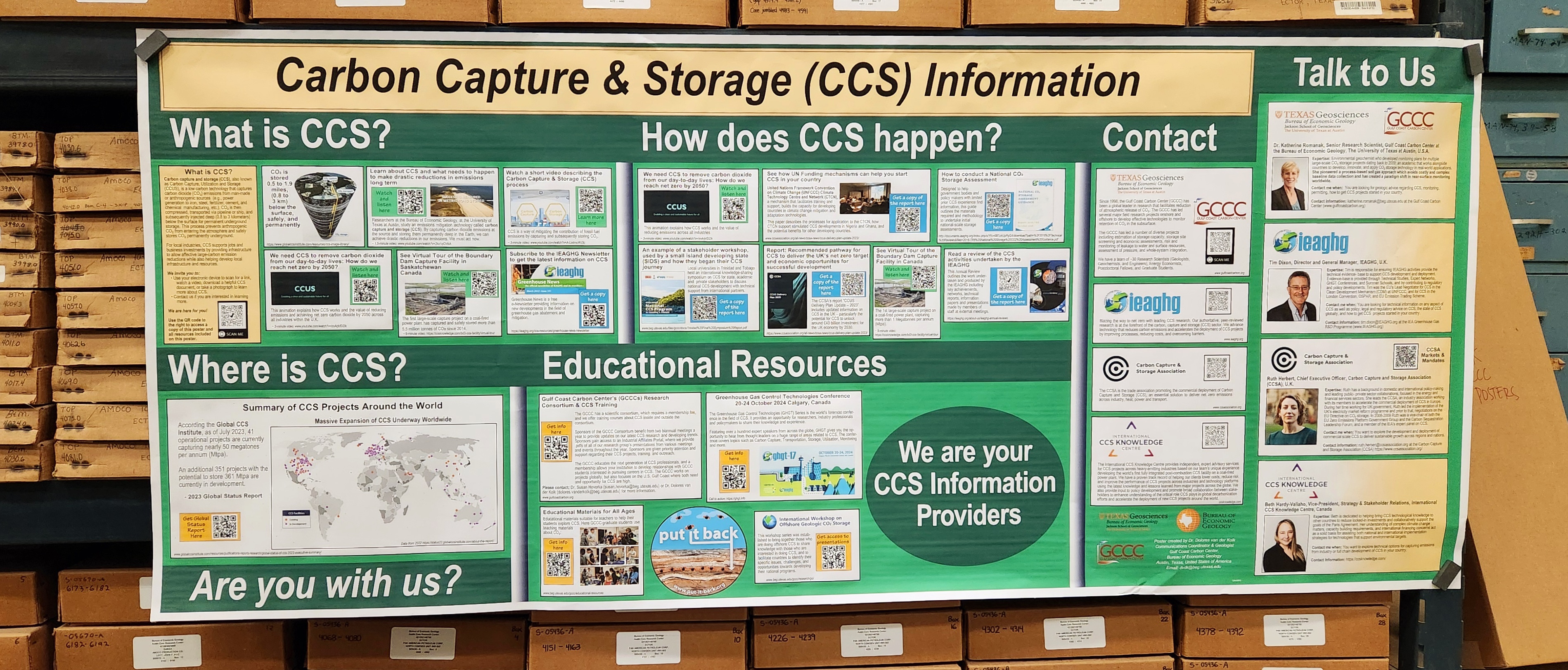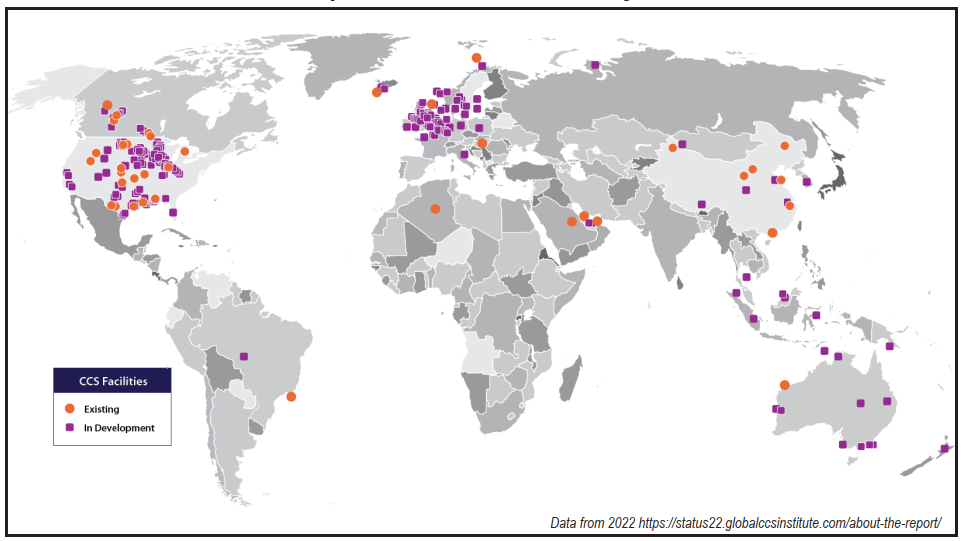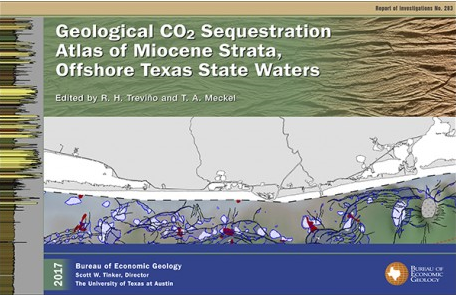UNFCCC COP 28
Click here for COP 29 activities
The 2023 United Nations Framework Convention on Climate Change, Conference of Parties (UNFCCC COP), commonly referred to as COP 28, will be held on November 30th to December 12, 2023, in Dubai, United Arab Emirates. Historically, the Gulf Coast Carbon Center (GCCC) partners with IEA Greenhouse Gas Research & Development Programme (IEAGHG), Carbon Capture & Storage Association (CCSA), and the International CCS Knowledge Centre to help circulate information about carbon capture and storage (CCS) at an exhibit.
View the COP 28 exhibit here. The following summarizes commentary and a current list of CCS events and resources shared at this conference.

COP 28 Commentary and Outcomes
- December 8, 2023 – COP28 Update at Halfway - BLOG (Tim Dixon, ieaghg.org)
- December 12, 2023 – Update on COP28 at almost the end - BLOG (Tim Dixon, ieaghg.org)
- December 13, 2023 – Reflections on COP 28 Dubai from the CCS Scientist in the Room (Katherine Romanak, GCCC)
- December 14, 2023 – Reflections on COP28's first global stocktake - BLOG (Tim Dixon, ieaghg.org)
COP 28 Special Events
- December 3, 2023, 11:30-13:00, “Can Carbon Capture and Storage Decarbonise the Cement Sector in Developed and Emerging Economies?” located in the Blue Zone SE1 room 175 (download agenda here)
- December 6, 2023, 10:00-11:00, Carbon Capture and Storage Developments in Small Island Developing States, located in the Blue Zone, Clean Air Task Force’s Zero Carbon Future pavilion (download agenda here)
What is Carbon Capture and Storage (CCS)?
- Learn about CCS and what needs to happen to make drastic reduction in emissions long term by researchers at The University of Texas at Austin, Bureau of Economic Geology, Gulf Coast Carbon Center (1.5-minute BEG GCCC video)
- Watch how CCS is a way to mitigate the contribution of fossil fuel emissions by capturing and storing CO2 (3-minute IEAGHG video)
- Explore how CCS works and the value of reducing emissions and achieving net zero carbon dioxide by 2050 across all industries within the U.K.
- Tour the Boundary Dam Capture Facility in Saskatchewan, Canada (9-minute CCS Knowledge Center video)
- Subscribe to the IEAGHG Newsletter to get the latest information on CCS
How does CCS happen?
- Discover how CCS works and the value of reducing emissions across all industries. How do we reach net zero by 2050? (3-minute video)
- The United Nations Framework Convention on Climate Change (UNFCCC) Climate Technology Centre and Network (CTCN) is a mechanism that facilitates training and support, and builds the capacity for developing countries in climate change mitigation and adaptation technologies. Review a paper describing the processes for application to the CTCN, how CTCN support stimulated CCS developments in Nigeria and Ghana, and the potential benefits for other developing countries.
- How do you conduct a national CO2 Storage Assessment? Designed to help government bodies and policy makers with limited prior CCS experience find information, here is a guide that outlines the materials required and methodology to undertake initial national-scale storage assessments.
- Study an example of a stakeholder workshop, used by a small island developing state (SIDS) and how they began their CCS Journey. Local universities in Trinidad and Tobago held an international knowledge-sharing symposium on CCS for state, academic and private stakeholders to discuss national CCS development with technical support from international partners.
- Investigate a case study: Recommended pathway to deliver the UK’s CCS goal of net zero emissions The CCSA’s report “CCUS Delivery Plan Update – 2023” includes updated information on CCS in the UK – particularly the potential for CCS to unlock around £40 billion investment for the UK economy by 2030.
- Survey CCS activities undertaken by the IEAGHG. This Annual Review outlines the work undertaken and produced by the IEAGHG including key achievements, networks, technical reports, information papers and presentations made by members of staff at external meetings.
Where is CCS today?

According the Global CCS Institute, as of July 2023, 41 operational projects are currently capturing nearly 50 megatones per annum (Mtpa). An additional 325 projects with the potential to store 361 Mtpa are currently in development.
Review the Global CCS Institute’s Global Status of CCS 2023 – Executive Summary.
Educational Resources
- Attend and follow the Greenhouse Gas Control Technologies Conference, 20-24 October 2024 Calgary, Canada
- The Greenhouse Gas Control Technologies (GHGT) Series is the world's foremost conference in the field of CCS. It provides an opportunity for researchers, industry professionals and policymakers to share their knowledge and experience. Featuring over a hundred expert speakers from across the globe, GHGT gives you the opportunity to hear from thought leaders on a huge range of areas related to CCS. The conference covers topics such as Carbon Capture, Transportation, Storage, Utilization, Monitoring and more.
- Access presentations from the International Workshop on Offshore Geologic CO2 Storage knowledge with those who are interested in doing CCS, and to facilitate countries to identify their specific issues, challenges, and opportunities towards developing their national programs.
- Receive CCS Educational materials that are suitable for teachers (K-22) to help students explore CCS.
We are your CCS Information Providers
- Gulf Coast Carbon Center, located at the Bureau of Economic Geology, at The University of Texas at Austin
- IEAGHG
- Carbon Capture & Storage Association
- International CCS Knowledge Center

Last updated February 7, 2024



